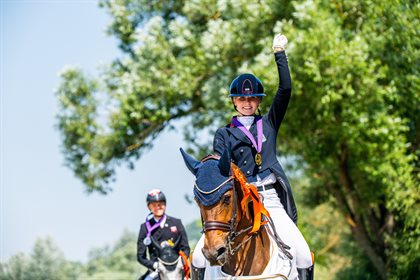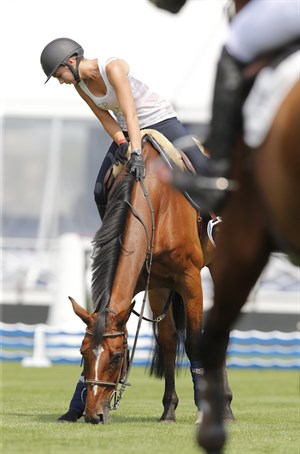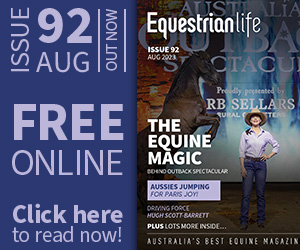|

|
This article has appeared previously with Equestrian Life. To see what's in our latest digital issue, click here.

Image: FEI/Lukasz Kowalski.
Harnessing your emotions
Good riders have feel, something that can’t be taught. What you can learn though, is how to control your feelings, and that’s the key to understanding whether your horse also has feelings. Let’s explore the importance of emotions to riding.
BY KERRY MACK
WHY DO WE have feelings? You may have asked yourself this when you are engulfed with sadness or grief, or burning with rage. There has to be some evolutionary survival advantage to having feelings. Actually, our feelings give us special information about things we notice. Feelings motivate us to action and can help us make decisions.
Disgust is a feeling that tells us to stay away, for example, from a rotting carcass or a badly behaved young man, so disgust helps to keep us safe. Fear helps us run away, switching on the stress system we have explored in previous articles. When we are afraid, our hearts pound, we breathe faster and we are more able to run away. We feel anger when we believe we are being attacked or when someone is pushing our boundaries. Anger also activates the stress response. Anger helps us fight.
The psychologist Shaver proposed that we have six primary emotions, from which a wide range of emotions can be derived. Love, joy, surprise, fear, anger and sadness are the primary emotions. Surprise motivates curiosity and learning, love motivates connection and attachment. Joy motivates us to do again whatever brought joy. Sadness helps us process loss. The secondary emotions are feelings we have after we have thought about the significance of the event. Shame (feeling bad about something we are) and guilt (feeling bad about something we did) are examples of secondary feelings, but help us learn to comply with expectations and rules. Pride in an achievement is related to joy.
Most of us learned that to be good riders we should keep our feelings under control. We should remain calm and achieve equanimity. However, it is clear that we should not be aiming to subdue all our feelings when we are riding. Of course, riding and training can fill us with happiness, joy, even elation, such as the amazing excitement of coming home safe after an exhilarating cross-country run, a great showjumping round. For dressage riders it is riding the freestyle at a big venue. Day-to-day training can also be really satisfying, seeing a young horse become a more confident individual, seeing him build up muscles and become more beautiful. It is what motivates us the most to ride. Happiness circuits in the brain are involved in addictions. Often we talk of being addicted to horses and equestrian sports. Addictions come from the wish to experience happiness again. Most of us have some emotional attachment to our horses, and some of us feel strong love for them. This attachment drives our concern for their welfare, motivates us to get up in the morning and feed before work, change wet rugs, and learn how to become the best trainers we can be.

Taking it easy in the warm-up session - Jane Richard Philips on Pablo de Virton.
© Stefano Grasso LGCT
Anger, as I have said, is a reaction to perceived attack, or boundary violation. Anger helps us to fight, and makes us strong and assertive. Our heart-rate goes up, we pump more blood around, breathe faster and have more tension in our muscles for a quick and strong reaction. Anger has a spectrum from annoyance and assertiveness through determination to rage. Of course, there is never a situation where it is okay to be enraged with a horse. This is likely to lead to abuse. We must learn to be in control of our feelings, especially anger.
However, I believe that there are times when a bit of anger can help a rider to be effective. This is the case especially for women, who so often need a bit of anger to be strong and determined. A horse is obviously a lot stronger than us. We need to be able to enforce appropriate boundaries, and famous showjumping coach George Morris has said that horses go better if we hate them a bit. I think he is referring to the power a bit of hate can tap into. If your horse stops at a fence, he may be more likely to tackle it if you feel angry enough to be more determined on the second approach. Flogging him in rage though, may not help you. You are likely to be less effective. Some horses will fight you back. Perhaps mares and stallions are more likely to fight back. You should never pick a fight that you can't win. There is the old adage, which I subscribe to, that you can tell a gelding, ask a mare and negotiate with a stallion. A bit of anger can give a rider the determination to persist, and insist that the horse does what is asked, for example go on a float, or through a puddle. Just keeping the pressure on and persisting will usually win out. A bit of anger can prevent you from giving up and rewarding him for doing the wrong thing, removing pressure before he has done what is asked of him. So it can be good to notice when you feel angry at him, as we all will from time to time, and use anger constructively, keeping it under control so that we do not use anger inappropriately. It may be necessary to stop, breathe out, calm down and even sometimes change the subject by finding a task that he will do, to get the job done in stepping stones.
Fear helps us run away, and extreme fear or terror helps us freeze when it may help keep us safe. Fear may help you back off, or get out of the way when you need to. However, particularly when you are riding young horses, a rider’s fear will not help a young horse develop confidence. If you are afraid get help and possibly get someone more experienced to help your young horse, learn that those scared new things are okay. Prevent a problem, don't wait to have to fix it.
Our feeelings are mediated by the right side of the brain, the side until recently considered the non-dominant hemisphere. When we are born we are in fact right brain-dominant and it is only at around three years old that the left hemisphere of the brain starts to mature. We learn a lot in the first three years that we remember implicitly, as if it's in the back of our heads. Explicit memory is the thing we can recall consciously. The fact that we have implicit memory explains the presence of the unconscious. So not only can feelings motivate us consciously, but also unconsciously.
The right side of the brain is associated with instinctive behaviour. The Nobel prize-winning psychologist Daniel Kahneman has written about how we can recognise two broad ways in which we make decisions. When we make quick decisions we are (to overgeneralise) using our right-sided, emotion-informed brain circuits. When we make rational, considered decisions we think much slower, and generally use left-sided brain circuits, and we use language based skills to reason. This process is much slower. We often need to make quick decisions when involved with horses, decisions are often based on unconscious and feeling-based processes.
So, do horses have emotions? This is difficult to research so there is very little objective evidence to inform us. There has been a tendency on one hand to anthropomorphise and interpret horse behaviour as if horses have feelings like us, and on the other hand to dismiss the possibility that lower animals have feelings and reduce behaviour to the effect of learning rather than attribute meaning.
However, Robert Plutchik took an evolutionary perspective on feelings and theorised that mammals experience basic feelings in a similar way to humans. I think it's reasonable to expect that horses can experience the primary emotions, based on what we know about the neuro-anatomy and evolution. Feelings such as fear, anger, love (attachment), joy, surprise and sadness are mediated by the mid-brain, a deep and old area of the brain that horses have. The secondary emotions that are a result of having thoughts about something that evokes a primary feeling are probably out of reach of horses. They do not have the brain mechanisms such as the pre-frontal cortex that we know are involved in complex feelings such as guilt and shame. Another reason to derive that mammals, including horses, have feelings is that we can see a purpose for feelings to guide action just as they do for people, the fast-thinking circuits we already referred to.
Horses, being strong on instinct, can be quite sensitive to our emotional state. A horse that has a secure attachment to his person will tend to be calmer if that person is calm. There are skilled psychotherapists who use this capacity of horses to respond to feelings to help people make the unconscious shifts required to recover from psychological trauma. The horse functions as a kind of co-therapist.
I hope I have made a case that you should not ride without feelings in order to ride with feeling! However, you should always be able to have your feelings under control, to be able to regulate your feelings. The ability to regulate feelings and think and feel at the same time, and to really understand the experience of your horse, will help you be the best trainer that you can be, whatever your discipline.
READ THE LATEST NEWS ARTICLES HERE

|

|

